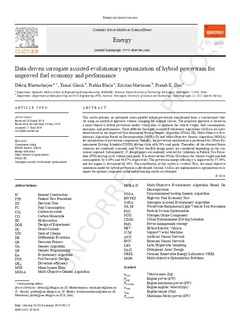| dc.contributor.author | Bhattacharjee, Debraj | |
| dc.contributor.author | Ghosh, Tamal | |
| dc.contributor.author | Bhola, Prabha | |
| dc.contributor.author | Martinsen, Kristian | |
| dc.contributor.author | Dan, Pranab | |
| dc.date.accessioned | 2019-08-19T08:47:31Z | |
| dc.date.available | 2019-08-19T08:47:31Z | |
| dc.date.created | 2019-06-22T17:03:09Z | |
| dc.date.issued | 2019 | |
| dc.identifier.issn | 0360-5442 | |
| dc.identifier.uri | http://hdl.handle.net/11250/2608934 | |
| dc.description.abstract | This article presents an optimized series-parallel hybrid powertrain transformed from a conventional vehicle using an analytical approach without changing the original chassis. The proposed approach is based on a many-objective hybrid powertrain model, which aims to optimize the vehicle weight, fuel consumptions, emissions, and performances. Three different Surrogate Assisted Evolutionary Algorithms (SAEAs) are introduced based on the improved Non-dominated Sorting Genetic Algorithm (NSGA III), Multi-Objective Evolutionary Algorithm Based on Decomposition (MOEA/D) and Multi-Objective Genetic Algorithm (MOGA) for optimization of powertrain components. Initially, the powertrain optimization is performed for Urban Dynamometer Driving Schedule (UDDS) driving cycle with 20% road grade. Thereafter, all the obtained Pareto solutions are combined, screened, and 78 best feasible design points are considered depending on the constraints imposed. Subsequently, 15 design points are randomly selected for validation in Federal Test Procedure (FTP) driving cycle without road grade. It is observed that NSGA III reduces the vehicle weight and fuel consumptions by 4.39% and 46.47% respectively. The powertrain energy efficiency is improved by 57.49%, and the engine is downsized by 40%. The contribution of this article is twofold. First, the many-objective simulation model for hybrid powertrain is developed. Second, SAEAs are implemented as optimization techniques for optimal component sizing and promising results are obtained. | nb_NO |
| dc.language.iso | eng | nb_NO |
| dc.publisher | Elsevier | nb_NO |
| dc.rights | Attribution-NonCommercial-NoDerivatives 4.0 Internasjonal | * |
| dc.rights.uri | http://creativecommons.org/licenses/by-nc-nd/4.0/deed.no | * |
| dc.title | Data-driven surrogate assisted evolutionary optimization of hybrid powertrain for improved fuel economy and performance | nb_NO |
| dc.type | Journal article | nb_NO |
| dc.type | Peer reviewed | nb_NO |
| dc.description.version | acceptedVersion | nb_NO |
| dc.source.journal | Energy | nb_NO |
| dc.identifier.doi | 10.1016/j.energy.2019.06.115 | |
| dc.identifier.cristin | 1707031 | |
| dc.description.localcode | © 2019. This is the authors’ accepted and refereed manuscript to the article. Locked until 22.6.2021 due to copyright restrictions. This manuscript version is made available under the CC-BY-NC-ND 4.0 license http://creativecommons.org/licenses/by-nc-nd/4.0/ | nb_NO |
| cristin.unitcode | 194,64,94,0 | |
| cristin.unitname | Institutt for vareproduksjon og byggteknikk | |
| cristin.ispublished | false | |
| cristin.fulltext | preprint | |
| cristin.qualitycode | 2 | |

